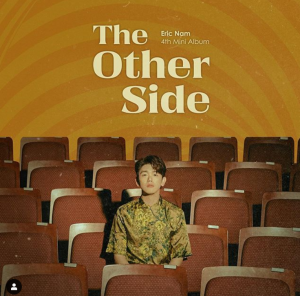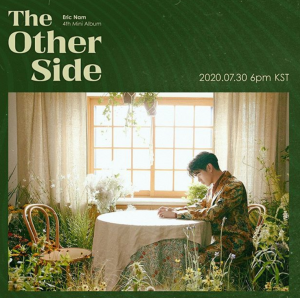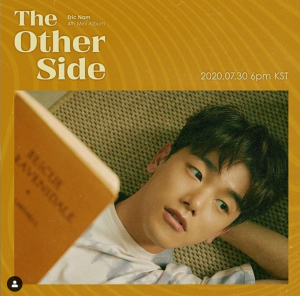
It’s Tuesday. You’ve gotten over the Monday hump, and you plan to get up, make breakfast, maybe go for a morning run. Another lazy or lonely day is likely on the docket again. Instead of crawling out of bed and facing the day, you roll over, snooze whatever (probably later than usual) alarm you had set, and go back to sleep for a little while longer. After all, this is quarantine. For some, hours become days, weeks, or painful months of much of the same thing. Despite all this, Eric Nam released a new album, The Other Side that urges to ask ourselves and each other, “How you been?”
As COVID-19 ravaged (and continues to ravage) the world and countries instituted lockdowns, the entertainment industry and many artists succumbed to a near social and performance standstill. Despite a resounding halt, one could argue that creatives never stopped. Artists continue to generate new and innovative solutions to continue interacting with fans and creating new music.
Thankfully, Eric Nam is one of them. No doubt the global pandemic had a significant influence in the way the album was conceived, produced, and recorded, but The Other Side manages to be both refreshing and thought-provoking. Full of earworms, it is an inspiration from Nam as the world copes with the fallout from COVID, with “the other side” only a dream for some countries. (Coming to you from the US here, hello.) Partially born out of an extended quarantine in the US, The Other Side is emotional, addictive, and uplifting while still remaining digestible.

The Other Side has five tracks, four original and one re-release with Korean lyrics rather than its original English. While daylighting as some flavor of love song, Nam’s music is often deeply layered, emotionally. See: “Love Die Young,” “Congratulations,” “Runaway,” etc. The Other Side seems similar on the surface; it is reflective and comforting without alienating Nam’s signature pop-centric style.
“Paradise,” the title track, reflects on better times and reminds us that “this too shall pass.” It is a pleasant, dance friendly track that urges listeners to explore their own paradise within themselves, whether that is a sun kissed vacation destination or a mysterious island that you are stranded on, with no hope of escape from, like in Castaway. In the case of love and quarantine, either interpretation seems to be viable.
Nam himself has said that the sound of “Paradise” is experimental compared to his previous songs. The melody of the synthesizer at the beginning is a clear example of that. It is important to point out the persistence of this melody. It is passed along to different voices throughout, to accommodate the vocals remaining relatively unchanged, melodically or rhythmically. This is a small detail, but it is consistent with the imagery in the music video. Throughout the song, uneasiness is personified through multiple realities or versions of oneself, as well as the definition of “paradise” itself. The crunchy, dissonant synthesizer line is the same as that nagging voice in the back of your mind. The lyrics are smart and bittersweet, despite having a happy timbre.
The music video is interesting, ethereal, and contemplative. Multiple Eric Nams interact with each other all experiencing different realities and eagerly chasing “the best reflection” of themselves. Portraying it as something not inherently positive that you can be “lost” in, subverts society’s often idealistic view of paradise. Rather than chasing a perfect ineffable paradise, Nam suggests facing cruel realities head-on. This bittersweet realistic take on the current world scenario is maybe more impactful given the wash of meme-able “ignore and all will be alright” and hear-no-evil mentalities that have become standard as of late.
“Trouble With You” and “Down for You” are complementary, not just in name but also in subject. From the title one would presume that “Trouble With You” would be more negative, but it is quite the opposite. The lyrics describe a feeling of lovesick, hopeless resistance. Whether the “you” is a person you cherish, a game you play through the night, or a book you cannot seem to put down, anyone can relate to the idolization of, or adherence to, what one loves. By contrast, “Down for You” exhibits a sort of reckless abandon. Memorable lyrics like “I would go down for you cause I am so down for you” are a personification of passion itself. There is no resistance here, the ledge has been leaped off of metaphorically and we are along for the ride.

There are not many surprises to be found in these dance friendly pop tracks musically. The harmonies are fairly standard, with some interesting sound samples and alluring vocals. With that being said, one of the charms of the album is its earworm-ability, while not complex, it is addictive and easy to sing along to, like much of Nam’s music normally is. They just feel good in a sense, and in a way that may be what fans need right now.
The two ballad tracks on this album especially stick out to me. While the rest of the songs are feel-good, fun and danceable tracks, “How You Been” and “Love Die Young” are raw, leaving the listener feeling as if they are getting a glimpse into quarantine-confined Eric Nam. Written like a letter to fans, friends, and family, “How You Been” expresses concern for a changing world, and wishes it were all just a bad dream. As the coronavirus became increasingly more serious worldwide, particularly in the United States and South Korea, Nam frequently posted updates both on his SNS as well as his podcast K-pop Daebak w/ Eric Nam via Dive Studios expressing a myriad of emotions, especially frustration and restlessness. Now as some countries begin to quell the infection and cope with enduring social changes, Eric Nam asks “how you been?” almost as if the last 6+ months were all a blur.

The complementary track “Love Die Young”, rerecorded in Korean, is fitting to bring back. As society exits from its social slumber, many are emerging changed. However, hopefully not at the expense of long held hopes, dreams, and aspirations. “Love Die Young” expresses the desire to retain parts of our life that we value, even when it may feel impossible.
One of my favorite things about this album is the ambiguous use of the word “you.” Amidst the craziness of a new pandemic normal around the world, it has become important for society to revolutionize how we interact with both others and ourselves. Concerts or gatherings are remote or closely monitored for potential danger, while hours, days, or weeks of social distancing provoke self-reflection, or criticism. The Other Side is no different. Commentary, conflict, and self-reflection are in harmony musically as well as thematically. The witty lyrics and infectious music make these issues more palatable and deeply personal, while remaining enjoyable to listen to from beginning to end.
(YouTube, Images via Stone Music Entertainment)


